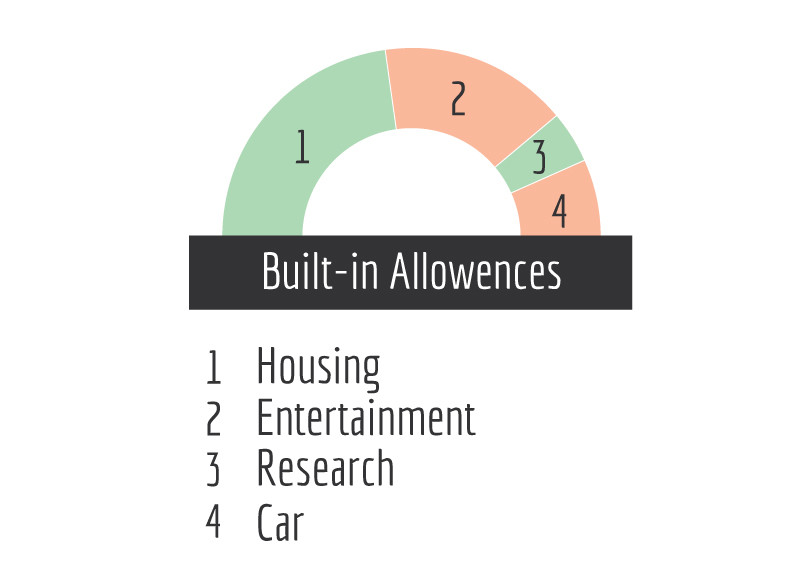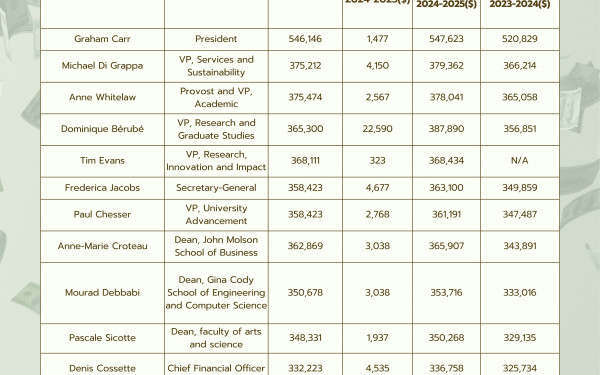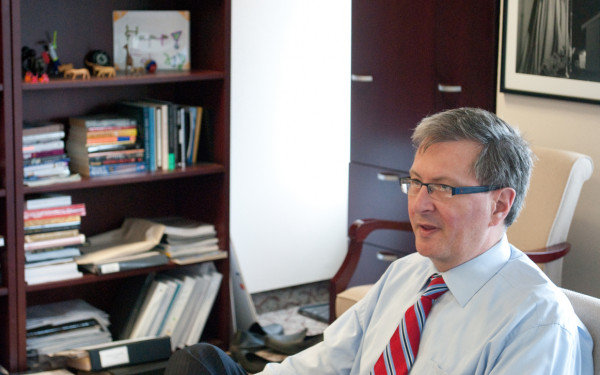Paying the President
ConU’s Presidential Salary Going Up
On Oct. 11 the Journal de Quebec reported that Concordia University’s presidential salary is getting bumped up a notch.
According to his contract, which The Link obtained later that day, Alan Shepard will be paid $7,000 more per year than his three most recent predecessors, bringing his yearly salary up to $357,000.
Concordia University presidents remain some of the highest-paid in the province.
“The president’s salary has been $350,000 for at least seven years,” said university spokesperson Chris Mota. “A decision was made to adjust it, and that basically represents a two per cent increase to reflect the cost of living, and that kind of thing. It was just deemed time to move it up.”
According to the university’s Policy Concerning the Remuneration of Senior Administration, the presidential salary is still capped at $350,000.
“The scales in the policy have not been updated in a number of years,” explained Mota. “This [decision for an increase] was approved last spring by the executive committee and it was reported to the Board [of Governors] at the time. It was part of the tidying up of loose ends.”
Along with the increase in his yearly salary, Shepard will also receive $4,200 per month as a housing allowance, or an additional $50,400 per year.
According to his contract, the president “will be required to host large groups at his residence as part of his duties of representation on behalf of the University and, as such, will require a significantly larger residence than he otherwise would.”
The president is also supposed to receive a $3,000 monthly entertainment allowance per the university’s standard policy, though that amount is not specifically mentioned in Shepard’s contract.
It does note, however, that the “professional development or scholarly research allowance” was doubled, bringing it to $10,000 per year.
The president also receives a $1,200 monthly car allowance, not including expenses associated with upkeep of the vehicle, which can be reimbursed.
The president’s good news wasn’t well received by everyone at Concordia, however.
“I think it’s deeply problematic, especially given that our previous presidents had been upfront and forthcoming, and Shepard seems to be following along these lines, that universities are underfinanced,” said Cameron Monagle, Concordia student and former undergraduate representative on Concordia’s Board of Governors.
Monagle voiced some concern about the increases in the president’s salary over social media, explaining in a Facebook post that he voted against Shepard’s candidacy and contract last spring.
“The fact is that Concordia is among the top tier of the highest-paid presidents, and if you include senior administrative salaries at the university, it’s an increasing percentage of our budget that is growing exponentially,” he added.
Though he was not part of the special committee tasked with finding a new president for the university last spring, Monagle took issue with the manner in which Shepard’s contract was negotiated.
“At no point was there a public discussion about the contract itself,” he said. “It was something that was presented to us, and there were a lot of concerns about that by all student governors. In the end it was something that was [already] negotiated and was sort of off the table to discuss or modify.”
Concordia Board of Governors Chair Norman Hébert, Jr. was unable to comment on the matter by publication time, as he is currently out of the country.
Admin Expenses
When the Journal de Québec published highlights from newly hired Concordia President Alan Shepard’s contract last week, there was a public outcry. While the numbers themselves raised eyebrows, they came as a particular blow to alumni and unions involved with labour relations at this school.
Built-in Allowances

Besides his base salary, Shepard’s written-in perks total over $100,000—the same amount as the salary for a tenured associate professor.
“When you read that Shepard is getting $350,000 plus perks, you say to yourself, ‘I can’t abide by this. I just can’t abide by this,’” said Jack Kornblatt, who along with his wife and fellow former professor Judith, ceased 38 years of donations this summer due to administrative “money grubbing.”
The perks don’t include Shepard’s expense account, which his predecessor Frederick Lowy charged over $80,000 worth of expenses to over the course of his 14-month term, as an Access to Information Request filed by The Link revealed.
“If [Shepard] were an honourable person he would, in fact, renounce the contract, renegotiate something smaller and forgo the perks,” said Kornblatt. “He’s not going to do that. He’s got obligations also.”
Competitive Contracts
Along with the perks and the expense account, Shepard received a $7,000 raise. It’s a move Concordia spokesperson Chris Mota explained was to index the salary to the cost of living. The president’s salary hasn’t been touched in seven years.
In 2010, Concordia librarians asked for a two per cent wage increase, plus cost-of-living adjustments going forward. They’re still stuck in negotiations and haven’t had an agreement in three years.
“I know for a fact that our secretaries are not very well paid. I know for a fact that our technicians are not very well paid. I know for a fact that our cleaners are not very well paid, that our guards are not very well paid,” said Kornblatt. “And that everybody else who works at the university is not very well paid–except for the administration.”
Cost of Living

When issues of administrative pay have come up in the past, previous governors argued that Concordia must compete with other universities and businesses to maintain top-quality administrators.
It’s an argument several union leaders have used as well—with less success.
Eddie Ginocchi, United Steelworkers Local 9538 vice-president, said to The Link in March that Concordia is struggling to hire maintenance workers.
“They can’t get new hires. We’ve had a lot of people going on pension. They can’t replace these people because they can’t find any,” Ginocchi said. “They don’t want to pay.”







_600_375_90_s_c1.jpg)